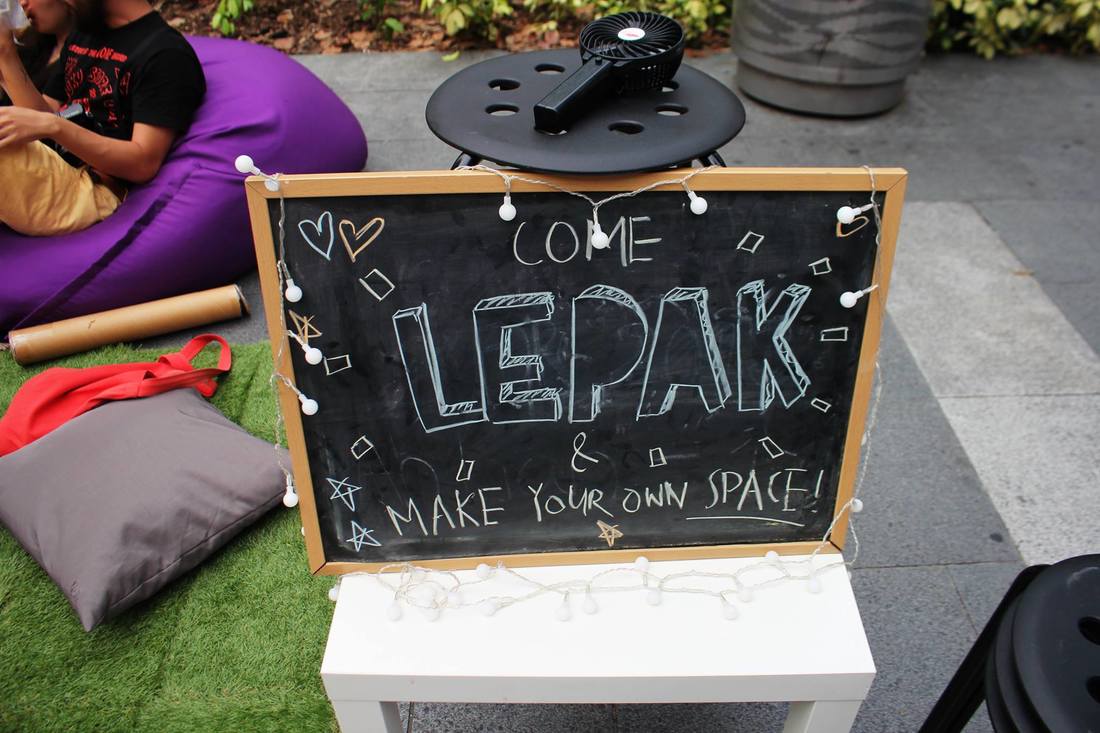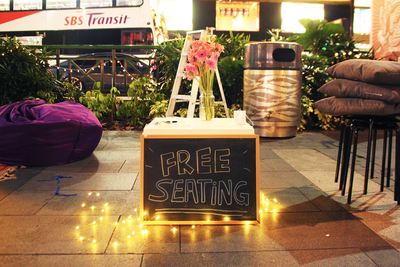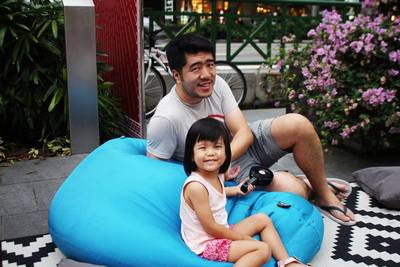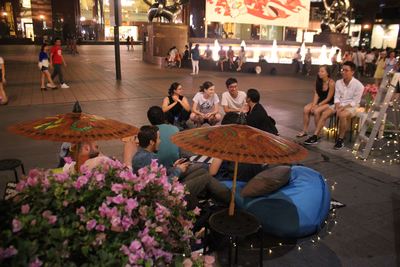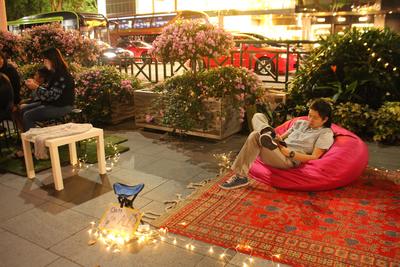Shifting Concretes:
Can We “Lepak” Better at Orchard Road?, Orchard Road, Singapore
(2017)
Public Community Art Project: Public Workshops culminated to Participatory Public Art Intervention
Orchard Road, Singapore
Orchard Road, Singapore
Orchard Road, as seen from recent news headlines, has lost its attraction. While it projects a glossy international image, it remains a place that people lack a sense of belonging to. How could one create an intervention that could help reconfigure Orchard Road as a space for greater social interactions to build a sense of belonging?
|
Shifting Concretes: “Can We Lepak Better at Orchard Road?” is a social interstice to question our pace of life and mundane encounters in the city. In many ways, it is also a disruptive experiment, urging shoppers to step out of the flow of traffic hustling individuals along the stretch of Orchard Road. To ‘lepak’ is a Singaporean slang meaning “to laze around.” Slowing down may be an unfamiliar concept to grapple in a fast-paced city, but we wanted to use ‘lepak’ as a form of encouragement for Singaporeans to extract themselves out of a mindless chugging forward – to slow down one’s pace by engaging with our intervention and develop an ability to construct a comfortable resting spot within a concrete environment. As such, our team brought together bean bags, picnic mats, fake grass patches, flowers, rugs, pillows and more to invade the pedestrian walkway of Orchard Road. Our intervention aimed to offer shoppers and pedestrians an opportunity to slow down, through providing the necessary materials to build their own comfortable space, customized to their needs.
|
Would you come lepak with us if we provided Free Seating smack right in the middle of our hot-spot shopping street at Orchard Road? |
Singaporeans may not be the most spontaneous crowd, and many deliberations hung over our minds as we staged the intervention for the public audience to participate in. Many pedestrians were curious if we were setting up a booth for profit, coming to us with questions, “is it really free,” “what are you selling me?” As much as we were trying to reconfigure the perceptions of others, it was an equally enriching learning process for our team. Questions on invisible power relations, performativity, surveillance, and objectification of space and participants slowly unravelled as the hours flew by: What constitutes a public art intervention? How do we engage audiences potentially unfamiliar with art practices, and challenge them to rethink their everyday spatial and social interactions? More so, the intervention had opened up a discursive space for the public to reinvent the spatial context. It provided a platform for the public to inscribe new meanings by transforming the existing structure and visual codes that usually define our built environment. We saw teenagers using our speakers to have a mini karaoke session, parents bringing their toddlers to engage playfully. Most memorably, we also attracted a group of Turkish tourists who came and shared their first-time experience in Singapore, spurring intercultural exchange to take place in the space. We noticed how people began to dwell longer in the city space, and in our own ways begin to unlearn how we should exist in a public space. Life and vitality in a public space need to grow and be defined by people who inhabit them through personal contact. A temporary action in urban space might not radically change Orchard Road, but having made a difference to an otherwise typical day at Orchard Road for many of the pedestrians we interacted with remains valuable in opening new perspectives. What we offered is a push for participants and pedestrians to develop an awareness of the negotiations they can make within a seemingly rigid space – perhaps the first turnings of cogwheels towards cultural reconstructions of public spaces waiting to be conceived and implemented.
|
|
|
About Shifting Concretes
Shifting Concretes is a public art project that focuses on how we inhabit our cities, and questions who gets to shape the urban spaces we live in. Bringing individuals from different disciplines together, participants collectively investigate notions of placemaking and conceptualising a public intervention through a series of workshops, expanding their engagement with art and its publics. Key to this interrogation is the reflection and reassessment of our urban experience in our city: What makes our spaces places for those who inhabit in it? How can we reach out to audiences outside the privileged art spheres, to challenge our usual spatial and social relations in direct encounters?
In the months leading up to our workshop, news headlines in Singapore were reporting on Orchard Road’s declining appeal. This tourist shopping hotspot projects a glossy international image, while at the same time embodying the “pulse of the city” in many ways. Many striking questions regarding personal engagement with the space arise, including whether a sense of belonging to such a space was conceivable for Singaporeans. Compelled to reassess our urban experience in our city and its emotional geography, our three-part workshop series was crafted to encourage participants to evaluate their own perceptions of Orchard Road. We wanted to provide a platform where participants could reconfigure a space that has been constructed as transitory for a large part of the population. At the same time, the project was also directed towards activating our public spaces to facilitate social interactions and discourses in civic life. http://peatix.com/event/254191 |
